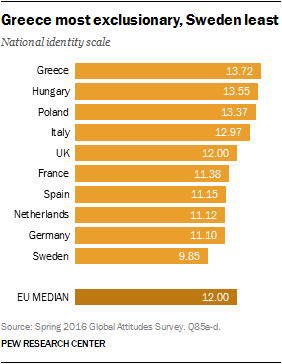National Identity Index

To further explore national identity across the countries surveyed, we developed an additive index. The index combines responses for the four survey questions that ask about national identity. Specifically, these questions ask how important each of the following items is to being truly of a particular country’s nationality: speaking the national language, sharing customs and traditions, being born in the survey country, and being a Christian.2 The internal consistency of the index was evaluated using a principal components analysis and Cronbach’s alpha reliability coefficient.
Responses for each of the four questions range between 1 and 4, where 1 indicates the least exclusionary sentiment and 4 represents the most exclusionary sentiment. For instance, those who say it is very important to have been born in the survey country in order to be truly that country’s nationality are coded as a 4 while those who say that this is not at all important are coded as a 1. The responses for the four questions are added together for an index that ranges from 4 to 16, where 4 represents the least exclusionary sentiment and 16 represents the most exclusionary.
Index scores are only calculated for respondents who gave substantive answers to all four questions, comprising a large sub-sample (n=10,239) out of the total sample (n=10,491). Those who replied “Don’t know/Refused” to any question were not included in the index.
We report the mean score for each country here. On a scale of 4 to 16, index scores range between 9.85 in Sweden and 13.72 in Greece. The overall EU median for all valid responses is 12.
In addition, we also recoded the scale into a dichotomous variable, where 1 indicates respondents who are at or above the EU median on the full scale and 0 indicates respondents below the median.




